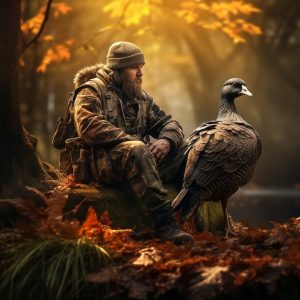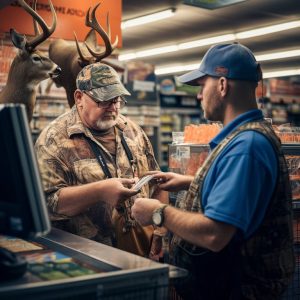If you’re an avid goose hunter or just getting started, you’ve probably heard that using decoys is a common practice. But what if you find yourself without those lifelike companions on your next hunting adventure?
Fear not! In this blog post, we’re diving into the exciting world of hunting geese without decoys and sharing some practical tips to help you make the most of your experience.
Whether you’re a seasoned hunter looking to try something new or a beginner wondering how to up your game without those trusty decoys, we’ve got you covered.
Let’s explore the strategies and techniques that can boost your chances of success when pursuing these elusive and majestic birds in their natural habitat. So, grab your gear, lace up those boots, and let’s embark on a decoy-free goose hunting journey together!
Contents
- 1 Research the Geese’s Habits and Behaviors
- 2 Know the Right Place to Hunt
- 3 Utilize Natural Blinds
- 4 Wear Camouflage
- 5 Consider Different Types of Calls
- 6 Be Prepared for Hunting Regulations
- 7 Conclusion:
- 8 FAQs
- 8.1 Can I really hunt geese successfully without decoys?
- 8.2 What should I focus on instead of using decoys?
- 8.3 How can I locate geese without decoys to draw them in?
- 8.4 What types of calls should I use when hunting without decoys?
- 8.5 Should I change my camouflage strategy without decoys?
- 8.6 Are there specific times of day that are better for hunting geese without decoys?
Research the Geese’s Habits and Behaviors
If you want to learn how to hunt geese without decoys, the first step is to research the geese’s habits and behaviors. Geese are social creatures and they typically travel in flocks.
They also have a hierarchy within the flock, with a dominant male leading the way. When it comes to feeding, geese prefer to graze on grasses and aquatic plants. They will also eat insects, crayfish, and small amphibians.
To successfully hunt geese without decoys, you need to understand their behavior and patterns. One of the best times to hunt geese is early in the morning, when they are just waking up and starting to move around.
Another good time to hunt is in the evening, just before they roost for the night. If you can find a spot where geese are feeding, that’s also a good place to set up your hunt.
When you’re out hunting, pay attention to the direction of the wind. Geese have a very strong sense of smell, so they will be alerted to your presence if you’re downwind of them. If you can position yourself upwind of the geese, they won’t be able to smell you and you’ll have a better chance of getting close enough for a shot.
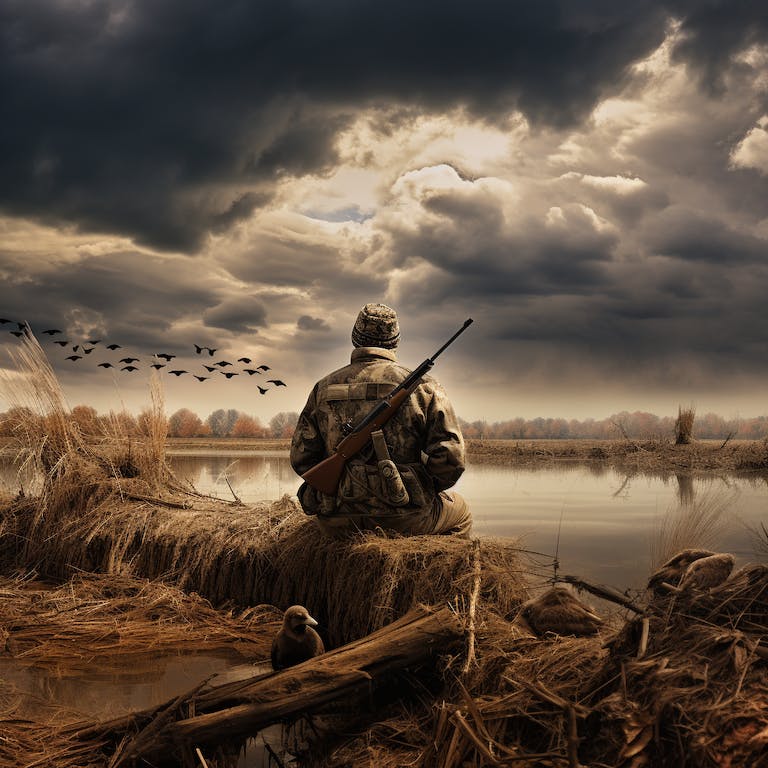
Camouflage is also important when hunting geese. Wear clothing that blends in with your surroundings, and use a blind or ground cover to conceal your movement. If the geese see you, they will likely take off and it will be much more difficult to get a shot.
Patience is key when hunting geese. Even if you’re in the perfect spot and everything is lined up perfectly, it can still take awhile to get a shot. Be patient and wait for the right opportunity. If you move too soon, you’ll likely scare the geese away and won’t get a chance to take a shot.
If you follow these tips, you’ll have a better chance of success when hunting geese without decoys. Researching the habits and behaviors of geese is the first step to becoming a successful hunter.
Know the Right Place to Hunt
If you want to be a successful goose hunter, you need to know where to find the birds. Obviously, this isn’t as simple as it sounds since geese are constantly on the move in search of food.
Fortunately, there are a few things you can do to give yourself the best possible chance of finding geese. Here are a few tips on how to find the right place to hunt.
Scout early and often:
One of the best things you can do is scout the area you plan to hunt before the season starts. This will give you a good idea of where the birds are feeding and will allow you to set up your blind or decoys in the right spot. Once the season starts, you should continue to scout so you can stay ahead of the birds.
Pay attention to weather patterns:
Another helpful tip is to pay attention to weather patterns. Geese are more likely to be in certain areas depending on the time of year and the weather conditions.
For example, in the spring they’ll be in areas with fresh green grass, and in the winter they’ll be in areas with open water. By paying attention to the weather, you can have a better idea of where the birds will be and when they’ll be there.
Check out the local farmer’s fields:
One of the best places to find geese is in the local farmer’s fields. Farmers typically don’t mind if you hunt on their property, as long as you ask for permission first. Geese like to eat the same things that farmers grow, so it’s a great place to find them.
Pay attention to the time of day:
Another helpful tip is to pay attention to the time of day. Geese are more active in the morning and evening, so that’s usually when they’ll be feeding. If you can, try to hunt during these times so you have a better chance of finding birds.
Now that you know a few tips on how to find the right place to hunt, you’re well on your way to becoming a successful goose hunter. Just remember to scout early and often, pay attention to weather patterns, and check out the local farmer’s fields. If you do these things, you’ll be sure to find plenty of geese.
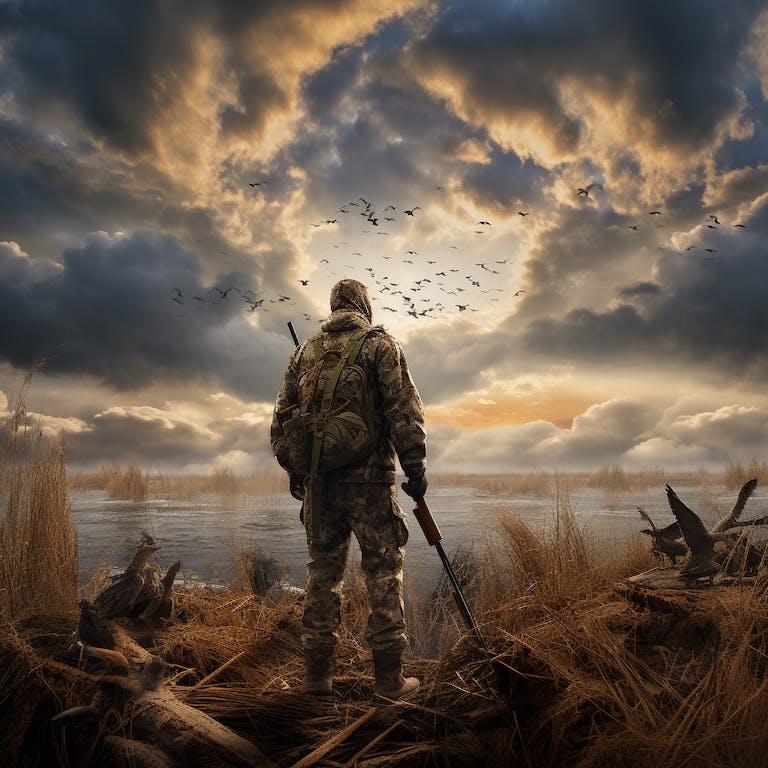
Utilize Natural Blinds
One piece of advice that all waterfowl hunters can agree on is the importance of utilizing natural blinds. A natural blind is simply an area of natural vegetation that conceals you from the view of approaching ducks or geese.
While many hunters choose to build their own man-made blinds out of materials like straw or reeds, utilizing a natural blind can be just as effective – if not more so. Here are a few tips on how to hunt geese without decoys by utilizing natural blinds:
- Look for areas of dense vegetation near likely feeding or resting areas for waterfowl. cattails, bulrush, and tall grasses are all good choices.
- Avoid areas that have been recently disturbed, such as areas that have been recently mowed or where there is a lot of human activity.
- Once you’ve found a promising spot, take some time to scout the area and make sure there are no potential hazards that could give away your position, such as branches that could brush against you or leaves that could crackle underfoot.
- When you’re ready to hunt, approach the blind quietly and take care to avoid making any noise that could alert the birds to your presence.
- Once you’re in position, stay still and wait for the birds to come to you. resist the urge to move, even if it’s just to adjust your position – the slightest movement can be enough to startle waterfowl and send them flying off.
Wear Camouflage
Geese are wild creatures and are very difficult to hunt without the use of decoys. However, there are a few things that you can do to increase your chances of success. One of the most important things is to wear camouflage.
When selecting a camo pattern, make sure to choose one that will work well in the environment where you plan to hunt. If you’re hunting in a marsh, for example, you’ll want a camo pattern that has a lot of brown and green in it. And if you’re hunting in a snow-covered field, white will be an important color in your camo.
In addition to wearing camouflage, there are a few other things you can do to increase your chances of success when hunting geese.
First, make sure to do your homework and know where the geese are likely to be. Second, use a good quality call to lure the geese in. And finally, be patient and wait for the perfect shot.
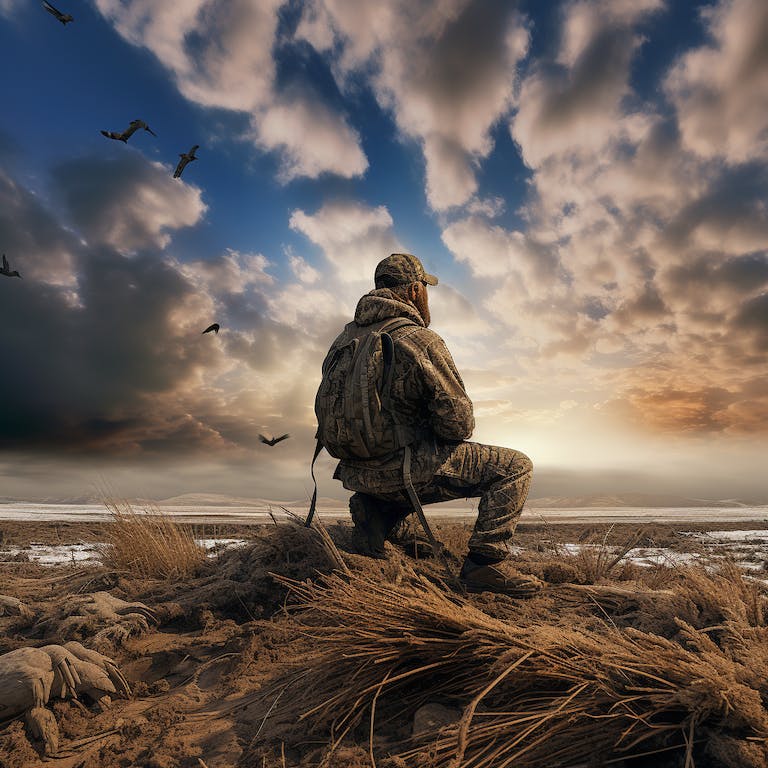
Consider Different Types of Calls
In order to be a successful goose hunter, it is important to consider different types of calls. There are many different types of goose calls on the market, and each has its own unique sound.
Some calls are designed to mimic the sound of a particular species of goose, while others are designed to mimic the sound of a particular type of call. It is important to experiment with different types of calls in order to find the one that is most effective for your hunting situation.
One type of call that can be effective for goose hunting is the inline call. This type of call is inserted into the hunter’s mouth and allows the hunter to control the sound that is emitted. The hunter can vary the sound by changing the position of the call in their mouth, and by controlling their breath.
Another type of call that can be effective for goose hunting is the diaphragm call. This type of call is placed over the hunter’s nose and mouth, and the hunter controls the sound by controlling their breath. Diaphragm calls are available in different sizes, and the hunter should choose a size that is comfortable for them to use.
Goose calls can also be effective for hunting other types of waterfowl, such as ducks. Duck calls are available in different styles, and the hunter should choose a style that is comfortable for them to use.
In order to be successful when hunting geese, it is important to consider different types of calls. By experiment with different types of calls, the hunter will be able to find the one that is most effective for their hunting situation.
Be Prepared for Hunting Regulations
Just as there are rules and regulations governing our everyday life, so too there are rules and regulations governing hunting. While these regulations may seem like a pain, they are in place for a reason – to ensure the safety of both the hunter and the prey.
Before heading out on your next hunting trip, be sure to familiarize yourself with the local regulations. Here are a few things to keep in mind:
• Depending on the state, there may be different regulations governing the hunting of different animals. For example, in some states it is legal to hunt deer with a rifle, while in others only shotguns are allowed.
• Some states have regulations regarding the use of decoys. In general, these states require that hunters use only a certain number of decoys ( usually six ) and that they be placed a certain distance from the hunter (usually 100 yards).
• Some states require that hunters wear fluorescent orange clothing while hunting. This rule is in place to help make hunters visible to other people in the area and to help prevent accidental shootings.
• Baiting rules vary from state to state, but in general, baiting is not permitted in areas where there is a high concentration of hunters. This rule is in place to prevent hunters from taking unfair advantage of the prey.
By familiarizing yourself with the local hunting regulations, you can help to ensure a safe and enjoyable hunting trip for everyone involved.
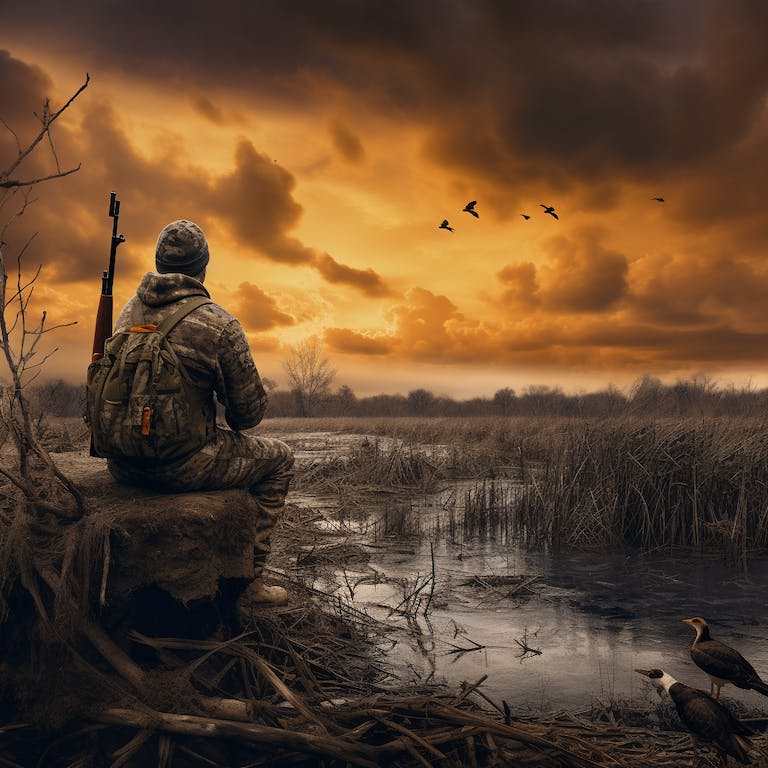
Conclusion:
In conclusion, hunting geese without decoys can be done, but it is not easy. There are a few things that you need to do in order to be successful. First, you need to find a spot where there is a lot of goose activity.
Second, you need to be able to call the geese in. And finally, you need to have a good hide so the geese cannot see you. If you can do these things, then you will be able to hunt geese without decoys.
I hope this article has helped you understand how to hunt geese without decoys. It is not as difficult as it may seem, but it does take some practice.
I encourage you to go out and try it for yourself. With a little bit of patience and practice, you will be able to call the geese in and have a successful hunt without decoys.
FAQs
Can I really hunt geese successfully without decoys?
Absolutely! While decoys are commonly used in goose hunting, it’s entirely possible to have a successful hunt without them. You just need to adjust your strategy and approach.
What should I focus on instead of using decoys?
Pay attention to natural elements that attract geese, such as feeding areas, roosting spots, and flight paths. Understanding their behavior and adapting to their movements will be key.
How can I locate geese without decoys to draw them in?
Scouting is crucial. Spend time observing geese in their habitat, noting their feeding patterns and resting areas. Look for areas with fresh water and ample food sources, and position yourself accordingly.
What types of calls should I use when hunting without decoys?
Mastering goose calls becomes even more essential in this scenario. Practice a variety of calls, including greeting calls, feeding calls, and comeback calls, to mimic natural goose sounds and attract their attention.
Should I change my camouflage strategy without decoys?
Yes, adapt your camouflage to the surroundings. Blend in with natural vegetation, use shadows to your advantage, and consider a layout blind to conceal yourself effectively.
Are there specific times of day that are better for hunting geese without decoys?
Early mornings and late afternoons are generally prime times for goose hunting. Geese are more active during these periods, making it easier to spot and engage them.

